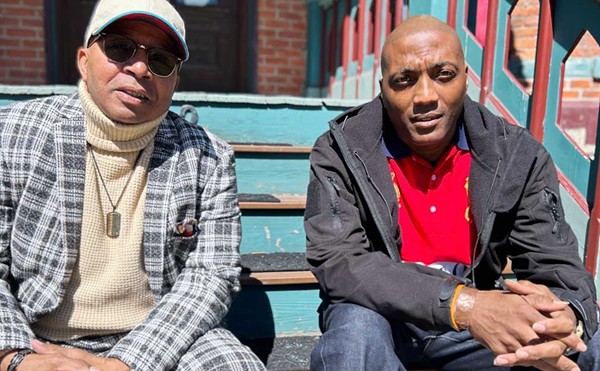When Larry Mongo talked to The Detroit News shortly after he and his wife, Dianne, received court-ordered eviction notices from the historic Himelhoch building after operating businesses there for 30 years, he struck a note that many other black business owners echoed.
"It's not the bad times that killed us," Mongo told the paper in January. "It's the good times."
The turnaround in that area of Woodward Avenue has been swift, and with a boon of real estate deals, new businesses, and fresh faces has come the conversation every neighborhood has on the topics of gentrification, race, and wealth. It wasn't just fellow African-American business owners who sided with Mongo but folks of every color who have continued to live and work in their neighborhoods through the ups and, more often, downs.
In the same week, Darnell Small, owner of the Tangerine Room club, and Gerald Watson, owner of the Mo Better Blues soul food restaurant, came forward with similar claims of being wrongfully edged out by their landlords. While Small, who was in the process of being evicted, believes the owners of his building simply want the space for their own use, Watson claims his landlords are racist and sought to rip him off because he's black.
With a trio of stories in the headlines, the immediate calls for protest landed. One group hoped to launch a "No Blacks Downtown" boycott that would clog the city's streets and businesses with African-American protesters, making it impossible for business to operate as usual.
But the Rev. Horace Sheffield, a longtime civil rights activist, didn't like that idea.
"It doesn't make sense to deter people from going downtown and supporting new businesses," Sheffield says.
Instead, he decided to host a January 26 community meeting that called on residents and business owners to come together and discuss ways to improve not only the standing of black-owned businesses, but also of residents who've spent most of their lives dealing with dwindling city services, ever-dilapidating neighborhoods, marginalization, and other plights. With all of the money pouring into downtown, Sheffield was looking for a conversation on how to get dollars into the neighborhoods.
"We're not anti-downtown," Sheffield says. "We think there should be comparable equity in the neighborhoods. They could become prime areas if they're given the attention that downtown is getting."
Which is where Sheffield's point intertwines with Mongo's.
"The people who have stayed here need to be given some kind of consideration," Sheffield says.
To that point, Sheffield says he's met with Dan Gilbert's "top three people" to discuss the idea of channeling cash to neighborhoods versus spending it all on downtown and Midtown.
"They're acutely aware of needing to do things in the neighborhoods," he says.
But Sheffield isn't waiting for Gilbert to save the day. Instead, he and fellow black Detroiters are moving to action.
On that January night, a committee was formed. The general premise of the group, dubbed the Detroit Generational Residents Council (DGRC), is to secure comparable consideration for neighborhoods as those enjoyed by major developers, major business owners, new investors, newcomers, and those currently engaged in the redevelopment of Midtown. With Sheffield heading the coalition, the DGRC hopes to get funds directed toward the city's residential neighborhoods.
And again, the issues at hand seem intimately correlated. Black and "generational" residents are watching downtown prosper as their neighborhoods continue to deteriorate, and many black-owned businesses feel like they're being booted out of downtown in order to usher in white, more suburban entrepreneurs.
It's a flashpoint conversation and an uncomfortable one too. And a lot of it boils down to "he said, she said." There are allegations of missed rent payments, racism, illegal actions that violate leases, sinister motivations, and more, and these allegations find their way into lawsuits and courtrooms. And, of course, to the media.
Here are just two stories on the radar as we round into 2015, when there will undoubtedly be many more.
***
Watson has owned Mo Better Blues for about a year. He alleges that the building's property manager, Sam Magar, wanted Watson to build out a space inside the Kales Building downtown so he could later move Watson out and get a "white business owner" to rent there, Watson says.
"Once we got the building repaired, they wanted to move us out," he says. "And we know it was racist; it's just something, as an African-American male, that you know the difference. It's racism. Just like if you were a woman, you know when there is something sexist going on. You can't describe it, but you know that it's happening."
Watson points to the fact that the property manager wanted to install a security camera inside Mo Better Blues as particular evidence.
"Sam Magar wanted to put a camera in our space," says Watson. "He wanted to put a camera in our space as if we were circus monkeys. A camera? What are you doing? How many other tenants does he have that are not black that he wants to put a camera in?"
While Watson says the camera was never installed, he lists a host of other incidents he felt disrespected by. He alleges that Magar would enter the space unannounced through the back door, that his landlords wouldn't tell him when maintenance workers were coming to work in the basement, and that property was stolen from his restaurant by someone who used the front door.
"What they thought they were going to do was get us to remodel the building, get our liquor license and our furniture and everything, and then push us out and put somebody else in here," says Watson.
But Magar's attorney says this is nothing but a rent case and that, in a year, he never paid rent, or the utilities that his lease stipulated he would pay.
"If they would have paid the rent, we wouldn't be having this conversation," says Henry Nirenberg, Magar's attorney.
As for the allegations that the dealings were racist: "Totally false," says Nirenberg. "We deny those allegations. They didn't pay the rent. This is just ... they didn't pay the rent. At the end of the day, the landlord is going to be responsible for all the mess."
Watson, who's brought nine charges against his landlords, eventually decided to move, but he wasn't leaving without his assets, even though he claims the property management and landlord tried to cheat him out of his property.
"They wanted to keep my granite countertops, my bathroom sinks, my [point-of-sale] system. The leverage was supposed to be a trade fixture. How is a computer a trade fixture? I can pick it up and walk out with it. I even took out some things like sinks and stuff that could have been debated. But they were trying to keep my personal items like my POS system. I've got my staff's Social Security in there, everything," Watson says.
Magar's attorney contends the assets should have belonged to the landlord since rent was never paid.
"All the improvements were going to belong to the landlord. I think he was in there six months or more and never opened up. He got the benefit of not paying rent at that time," Nirenberg says. "If he owed the landlord $100,000, that is equal to the free rent. He was in the space and didn't ever pay a dime. He argued he was entitled to the toilet; he took the flush handles and the partitions. He took everything. The judge allowed him to remove granite; he took his bar. He left behind maybe three things. We let him take the hot water tanks. He took all the lights, he took the light bulbs, he took the alarm system. He wanted to remove the emergency exit signs."
Jerry Belanger owns Park Bar, which is located across the alley from Mo Better Blues' space. While he doesn't see Watson's plight as necessarily caused by racism, he certainly thinks there are some dirty dealings happening.
"Gerald is an African-American in town with a business and there's no money for him. There's money for tearing down a building, there's money for the Whitney, there's money for Mike Ilitch, but here you have this guy and he's not eligible for money," he says. "There's no infrastructure for anyone but Mike Ilitch. If it's not Mike's property and Mike's not getting the business, then they don't qualify."
Belanger has seen the changes around the neighborhood and echoes Mongo's sentiment. It's the good times.
"I think Gerald is a victim of this change," Belanger says. "I don't think it was racist, but was it fair? If they were charging him rent, it was completely unfair. I think the prevailing problem, in my mind, is that this is not a city where political will is to raise the people who are in it to new economic levels. The political winds are trying to get people to move in who are more wealthy to increase the tax base. All of the newfound wealth in Detroit isn't because people who have lived here are suddenly becoming rich. I think [Watson] was doomed."
***
The issues facing Small and the Tangerine Room are strikingly similar. Small spoke with just about every media outlet in the city, reporting the terrors he faced under his landlord, Rivertown Development, LLC and Rivertown Holdings, LLC.
Small claimed his landlord tormented him, trying to force him out of the space he rents inside a building he shares with Atwater Brewery, eventually taking him to court and evicting him from the property. Small claims Atwater Brewery is behind all the torment, because they want the space they once occupied but lost due to missed rent payments.
He says Atwater now owns the building, but that the brewing company bought it after he signed a lease with the building's original owner. In truth, the building is owned by Rivertown Holdings, a company owned by Mark Rieth. Rieth also owns Atwater Brewery.
Soon after Rivertown took over the lease, the two companies started having problems.
Among his many claims, Small says Atwater removed lights from the outside of the building, which made it hard for patrons to locate his establishment, they painted the street in front of the building with "no parking" signs, and got the people who own the nearest lot to stop renting to him.
He says Atwater did these things in order to push him out because they wanted to rent the space to someone else or take it over for themselves.
Rieth's lawyer, Bryon Kelley, says Rieth and Atwater have nothing to do with it and that all of Small's claims are false, lies he worked up to get media attention.
According to Kelley, Small even testified that he demolished 75 percent of the building without the consent of his landlord, a direct violation of his lease. In a court document, the presiding judge says, "Tenant testified to making changes to approximately 75 percent of the premises. The Tenant testified without seeking written approval."
Kelley says all the accusations Small made to the media are false, and that they directly contradict statements he made while testifying.
When we spoke with Small, he said he'd done little more to the building than add some carpet and paint.
"I've always paid the rent, stayed on point, and I never — there's no structural change, let alone damage, no structural damage that they put in the court documents. You know, you put a carpet down and you paint. They just basically want me out," Small says. "All I did was move furniture in there. I put carpet and paint down. It's not destroyed. It's a nice place. Everything I can carry out of there. Not only did I not destroy, I didn't do any structural change, period."
But Kelley says Small did as much as tear down walls. He says he also painted an irreplaceable bar that was imported from Germany in 1999.
In the end, Small was evicted from the property and his appeals for a new case weren't met. Still, he sees his cases as part of a bigger fight for Detroiters and business owners.
"I wanna say this: It's not just my fight, it's Detroit's fight. And I have an obligation to stand as a businessman," Small says. And for me, I'm for all races coming downtown, let me be clear — I don't know about everybody else — I'm for African-Americans, white people, Asian, I mean I could go down a list — I'm for all of that."
While Small never made statements that his landlords were racist, he says others have to make that call for themselves.
"You know, really you would have to make a decision on that, I mean, it's a kind of a coincidence. From my standpoint, it's definitely greed and money capitalizing on the opportunity," he says.
In the end, maybe Belanger, the owner of Park Bar, has the right idea.
"I don't see anybody being kicked out, but I don't see anybody being invited in," he says. "And I don't like it."





